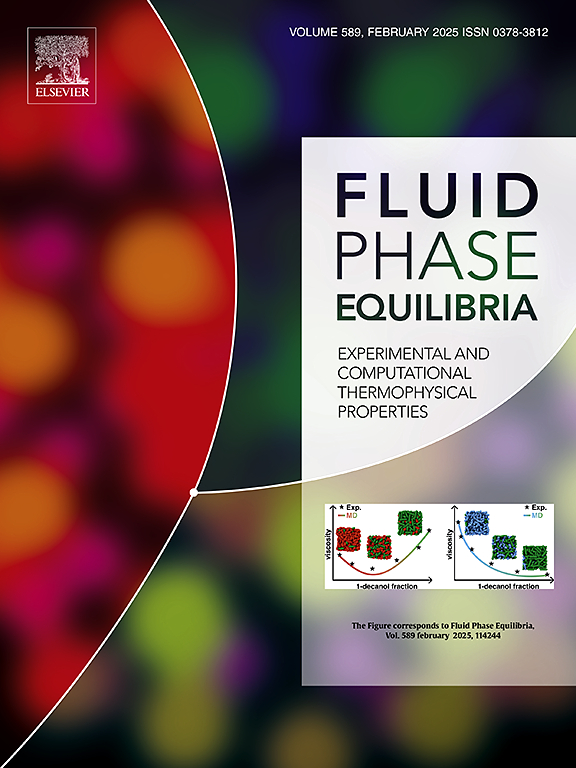A deep investigation of neo-pentane freeze-out in methane
IF 2.7
3区 工程技术
Q3 CHEMISTRY, PHYSICAL
引用次数: 0
Abstract
The investigation of the phase equilibrium behaviour of the methane + neopentane system has attracted a lot of interest in recent years seeing that neopentane is one of the heaviest natural gas components, a characteristic that poses a risk of freeze-out for the natural gas liquefaction process. Despite its high triple-point temperature (256.6 K), the solubility of solid neopentane in liquid methane is expected to be relatively high (a few percent at LNG temperatures) according to recent works dealing with the measurement and prediction of the solid-liquid(-vapor) equilibrium behaviour of this mixture. However, experimental phase equilibrium data are only available at temperatures down to 200 K or below 125 K, meaning that information is still missing in the 125 K < T < 200 K range. The aim of this work is to enhance the understanding of the thermodynamic behaviour of the methane + neopentane system by further experimental results concerning the solid-liquid, solid-vapor, solid-liquid-vapor, and vapor-liquid equilibria between 100 K and 240 K. If the results presented in this work confirm that neopentane is quite soluble in the liquid phase, they also indicate that the liquefaction pressure should be carefully chosen since neopentane is poorly soluble in vapor methane.-
甲烷中新戊烷冻出的深入研究
近年来,甲烷+新戊烷体系相平衡行为的研究引起了人们的极大兴趣,因为新戊烷是天然气中最重的组分之一,这一特性会给天然气液化过程带来冻出的风险。尽管固体新戊烷在液态甲烷中的溶解度很高(256.6 K),但根据最近对这种混合物的固-液(-蒸气)平衡行为的测量和预测,固体新戊烷在液态甲烷中的溶解度预计相对较高(在LNG温度下溶解度为几个百分点)。然而,实验相平衡数据只能在低于200 K或低于125 K的温度下获得,这意味着在125 K <中仍然缺少信息;T & lt;200k范围。这项工作的目的是通过进一步的实验结果来提高对甲烷+新戊烷体系的热力学行为的理解,这些实验结果涉及固体-液体、固体-蒸汽、固体-液体-蒸汽和蒸汽-液体平衡在100 K和240 K之间。如果这项工作的结果证实了新戊烷在液相中是相当可溶的,那么它们也表明,由于新戊烷在气态甲烷中难溶,因此应仔细选择液化压力
本文章由计算机程序翻译,如有差异,请以英文原文为准。
求助全文
约1分钟内获得全文
求助全文
来源期刊

Fluid Phase Equilibria
工程技术-工程:化工
CiteScore
5.30
自引率
15.40%
发文量
223
审稿时长
53 days
期刊介绍:
Fluid Phase Equilibria publishes high-quality papers dealing with experimental, theoretical, and applied research related to equilibrium and transport properties of fluids, solids, and interfaces. Subjects of interest include physical/phase and chemical equilibria; equilibrium and nonequilibrium thermophysical properties; fundamental thermodynamic relations; and stability. The systems central to the journal include pure substances and mixtures of organic and inorganic materials, including polymers, biochemicals, and surfactants with sufficient characterization of composition and purity for the results to be reproduced. Alloys are of interest only when thermodynamic studies are included, purely material studies will not be considered. In all cases, authors are expected to provide physical or chemical interpretations of the results.
Experimental research can include measurements under all conditions of temperature, pressure, and composition, including critical and supercritical. Measurements are to be associated with systems and conditions of fundamental or applied interest, and may not be only a collection of routine data, such as physical property or solubility measurements at limited pressures and temperatures close to ambient, or surfactant studies focussed strictly on micellisation or micelle structure. Papers reporting common data must be accompanied by new physical insights and/or contemporary or new theory or techniques.
 求助内容:
求助内容: 应助结果提醒方式:
应助结果提醒方式:


